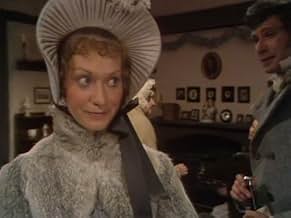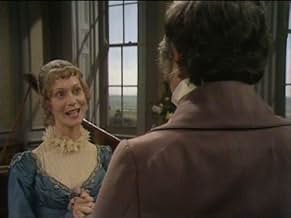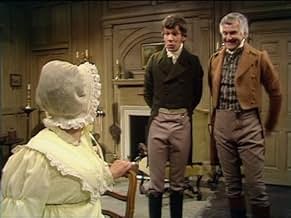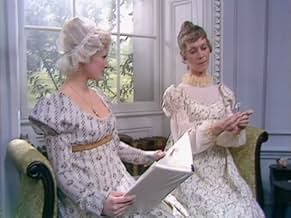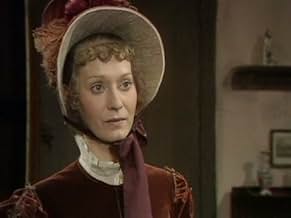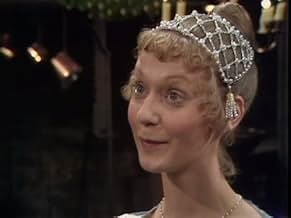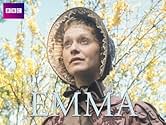Agrega una trama en tu idiomaWhile matchmaking for friends and neighbours, a young 19th Century Englishwoman nearly misses her own chance at love.While matchmaking for friends and neighbours, a young 19th Century Englishwoman nearly misses her own chance at love.While matchmaking for friends and neighbours, a young 19th Century Englishwoman nearly misses her own chance at love.
Explorar episodios
Opiniones destacadas
Of the four film and TV miniseries productions available of Jane Austen's "Emma," this one is the second best. This and the 1996 independent film that stars Gwyneth Paltrow are the only two that bring out the best of the comedy and characters as Jane Austen wrote and saw them. The 1996 movie is superior. But this 1972 miniseries is very good in all aspects. The screenplay is very good, the casting is very good and the performances mostly are very good.
The cast for this BBC production was not one of big names in film. Some were more prominent on the stage, and others had short careers in film and/or TV. But, for their lack of notoriety, several gave fine performances. Doran Godwin was exceptional as Emma Woodhouse. Donald Eccles played Mr. Woodhouse to perfection – as one could see him coming right off the pages of Austen's novel. No one else has equaled that performance. It should be noted that this early miniseries gave considerable time to his character, where most later productions saved time by reducing his film time.
Debbie Bowen presents a more girlish picture of Harriet Smith than most renditions. That's not a negative, but it's worth noting where all other productions have a somewhat more adult or serious character, none of which are quite as attractive though. The rest of the cast of this series are good. At four hours, this TV series didn't add anything that the best film (1996 with Gwyneth Paltrow) might have missed, but it expanded some of the scenes and developed a couple of the characters a little more.
Very few people have rated this production. Even though it is a few decades back, it would be sure to please those who enjoy Jane Austen and any of the other productions of "Emma." And, for any who haven't yet seen the 1996 independent film with Gwyneth Paltrow, be sure to do so. It stands alone at the top of the class of "Emma" films.
The cast for this BBC production was not one of big names in film. Some were more prominent on the stage, and others had short careers in film and/or TV. But, for their lack of notoriety, several gave fine performances. Doran Godwin was exceptional as Emma Woodhouse. Donald Eccles played Mr. Woodhouse to perfection – as one could see him coming right off the pages of Austen's novel. No one else has equaled that performance. It should be noted that this early miniseries gave considerable time to his character, where most later productions saved time by reducing his film time.
Debbie Bowen presents a more girlish picture of Harriet Smith than most renditions. That's not a negative, but it's worth noting where all other productions have a somewhat more adult or serious character, none of which are quite as attractive though. The rest of the cast of this series are good. At four hours, this TV series didn't add anything that the best film (1996 with Gwyneth Paltrow) might have missed, but it expanded some of the scenes and developed a couple of the characters a little more.
Very few people have rated this production. Even though it is a few decades back, it would be sure to please those who enjoy Jane Austen and any of the other productions of "Emma." And, for any who haven't yet seen the 1996 independent film with Gwyneth Paltrow, be sure to do so. It stands alone at the top of the class of "Emma" films.
I have seen each of the three main video versions of Emma (this 1972 BBC version, the Kate Beckinsale version, and the Paltrow version) several times (as well as having read the book) and I love each of them. It is so rare to get gentle, subtle, nuanced psychological drama, that I find I turn to Emma again and again. I think which one you enjoy most on a particular afternoon or evening will depend on your mood. The Paltrow version is lightest and funniest, entertainment to cheer you up; the Beckinsale version engages you as a serious drama of a beautiful young woman, is the most realistic, it is what you want if you want to feel transported back to the time the story happened. This 1972 version's strength is that it presents the psychological complexity of the characters with more fidelity and completeness to the portrayals in the novel. Due to the early 1970s production values, this version appears a bit stagy, and that can be off-putting if you've never seen that kind of TV before (I am a little over 50, so I remember seeing these kinds of productions when they originally aired, which may make it easier for me to get past the artificiality). One problematic element for me is that the actress who plays Emma is about 6 years too old, and she is not as attractive as Beckinsale or Paltrow, and these factors were a problem for me on my first viewing of this version. However, on second and subsequent viewings this was not so much of an issue, and I was able to appreciate her very nuanced portrayal of Emma's feelings and reactions and the process of learning more about human nature, and about the limitations of her own ability to imagine what the hidden feelings are of other people. Also, it took a second and third viewing to realize that the character of Emma's father, as presented here, is a comic character, because here, in a novel which is so much about weddings, he always finds weddings a distressing and melancholy business. His toast to the engaged couples in the very last scene (a toast not in the book) is a humorous reversal of the praise and delight for matrimony we expect. Another element that comes out in this version is the similarity between Emma's father, an invalid who always wants his daughter Emma by his side and who opposes the idea of her marrying, and Frank Churchill's step-mother, Mrs. Churchill, who is also an invalid who always wants her stepson Frank by her side and opposes the idea of his marrying. It always used to bother me that invalid Mrs. Churchill, who is so important to the story, never makes an appearance in the story, until I realized that, in effect, she had: she is the female version of Emma's father, and everything you want to know about her, you may find in him. The negative attitude of the characters towards her is likely the same negative attitude they would have towards him, if he lived far away and all they knew about him was that he used his claims of illness to keep his daughter close. The very last scene of this version also develops a similarity in the personalities of Emma and Frank that is missing from the other versions and that is necessary, I think, to understand just how psychologically complex Austen's novel really is.
A very refreshing thing about all versions of Emma is that every character is genuinely good-hearted and wants good for the other characters, but their own quirks, self-centeredness, and inability to understand other people means they cause pain to each other despite their good intentions. The only exception to this is Elton, who justly feels that Emma misled him about her affections in her attempt to unite him to Harriet, and in unjust retaliation he snubs Harriet on one occasion. The characters' ability to find happiness depends not on whether they defeat some unrealistic 'bad guy,' but on their ability to learn more about the true understanding of what others feel, and what they feel themselves. That's what the art of story-making should focus on, in whatever form (book, movie, TV, or stage) the story is told.
A very refreshing thing about all versions of Emma is that every character is genuinely good-hearted and wants good for the other characters, but their own quirks, self-centeredness, and inability to understand other people means they cause pain to each other despite their good intentions. The only exception to this is Elton, who justly feels that Emma misled him about her affections in her attempt to unite him to Harriet, and in unjust retaliation he snubs Harriet on one occasion. The characters' ability to find happiness depends not on whether they defeat some unrealistic 'bad guy,' but on their ability to learn more about the true understanding of what others feel, and what they feel themselves. That's what the art of story-making should focus on, in whatever form (book, movie, TV, or stage) the story is told.
10johnbol
If you are a Jane Austen fan and considering to buy a film of Emma i would recommend this version. This because , as a TV series it's longer then any movie and therefor includes more of the original story. Also the acting is very good and the whole production has a Austen feel about it. Yes it's been mostly filmed in a studio but to me that gives it a more intimate feeling. Also i have to say that i did like the version with Kate Beckinsale but do not really care of the version with Gwyneth Paltrow. This TV series lasts about 4 and a half hours. So, if you look for a shorter version , take the Beckinsale and if you really want to dive into it, take this one. I would like to single out Donald Eccles who , as Emma's father, is very funny as is Mary Holder as Mrs. Bates.
I have rated this quite highly on two counts - one, the casting (largely forgotten names litter the cast including Doran Godwin as Emma, John Carson as Mr Knightley, Debbie Bowen as Harriet, Constance Chapman as Miss Bates, and Timothy Peters as Mr Elton) and two, an absorbing adaptation even if done in obviously studio (and rather cheap) sets.
Running at four hours plus, this version does more justice to the book than more cursory and recent attempts have been able to. Although both Emma and Knightley come across as a little older than they should be (21 and 39 I believe in the book), their growing understanding is believable, and you do find yourself hoping for that elusive happy ending.
What does mark it down is the annoying tune! Quick bit of trivia: Blackadder fans should note that Robert East, Prince Harry in the first series, is here as Frank Churchill.
Running at four hours plus, this version does more justice to the book than more cursory and recent attempts have been able to. Although both Emma and Knightley come across as a little older than they should be (21 and 39 I believe in the book), their growing understanding is believable, and you do find yourself hoping for that elusive happy ending.
What does mark it down is the annoying tune! Quick bit of trivia: Blackadder fans should note that Robert East, Prince Harry in the first series, is here as Frank Churchill.
This old BBC serial from the 70s is a slow ramble through one of Jane Austen's great novels. Like all slow rambles there are lots of incidental delights on the way. Time is given for the development of character and the unravelling of the plot. The later film with Gwyneth Paltrow is faster but shallower. This is plainly filmed and there is none of the gorgeous lighting effects that decorate the Paltrow film. Some of it is shot outdoors, notably the Box Hill scene, but it is mainly unfussy interiors.
Doran Godwin's performance as Emma is fine. She brings out the contradictions and weaknesses in her character as well as her many strengths. Jane Austen wanted a heroine that no one would like but herself, then proceeded to create a fully rounded character who is very likeable. The length of the mini-series enables there to be many scenes between Emma and Harriet and Emma and Mr Knightly that illustrate all their characters well. Debbie Bowen and John Carson give excellent support.The rest of the cast of British actors are good. Constance Chapman as Miss Bates is touching and Fiona Walker rips into the part of Mrs Elton with great relish. Donald Eccles is perfectly tiring as Mr Woodhouse.
There seem to be two ways to film Jane Austen. The slower but more complete version like this film and 'Sense and Sensibility' (1971) or the modern upbeat shorter film like 'Emma' (1996) or 'Mansfield Park' (1999). Perhaps only the BBC's 1995 mini series of 'Pride and Prejudice' created the perfect fusion.
This 'Emma' is well worth seeing. If you adjust yourself to the gentle pace there is plenty to enjoy
Doran Godwin's performance as Emma is fine. She brings out the contradictions and weaknesses in her character as well as her many strengths. Jane Austen wanted a heroine that no one would like but herself, then proceeded to create a fully rounded character who is very likeable. The length of the mini-series enables there to be many scenes between Emma and Harriet and Emma and Mr Knightly that illustrate all their characters well. Debbie Bowen and John Carson give excellent support.The rest of the cast of British actors are good. Constance Chapman as Miss Bates is touching and Fiona Walker rips into the part of Mrs Elton with great relish. Donald Eccles is perfectly tiring as Mr Woodhouse.
There seem to be two ways to film Jane Austen. The slower but more complete version like this film and 'Sense and Sensibility' (1971) or the modern upbeat shorter film like 'Emma' (1996) or 'Mansfield Park' (1999). Perhaps only the BBC's 1995 mini series of 'Pride and Prejudice' created the perfect fusion.
This 'Emma' is well worth seeing. If you adjust yourself to the gentle pace there is plenty to enjoy
¿Sabías que…?
- TriviaThe actors playing husband and wife John and Isabella Knightley(Yves Tighe and Belinda Tighe)are brother and sister in real life.
- ErroresThe characters are seen playing cards with a modern deck of cards that show both the suit symbol (hearts, clubs, spades, clubs) and a number on each corner. During the time period the movie was set in, playing cards did not show the number of the card in the corners.
- ConexionesFeatured in Funny Women: Mollie Sugden (1999)
- Bandas sonorasThe Twenty-ninth of May
Traditional
From John Playford's 'The English Dancing Master', First Edition (1651)
[theme]
Selecciones populares
Inicia sesión para calificar y agrega a la lista de videos para obtener recomendaciones personalizadas
- How many seasons does Emma have?Con tecnología de Alexa
Detalles
- Fecha de lanzamiento
- País de origen
- Idioma
- También se conoce como
- Эмма
- Locaciones de filmación
- Uppark House, South Harting, West Sussex, Inglaterra, Reino Unido(Exteriors of Hartfield, Emma's home)
- Productora
- Ver más créditos de la compañía en IMDbPro
Contribuir a esta página
Sugiere una edición o agrega el contenido que falta

